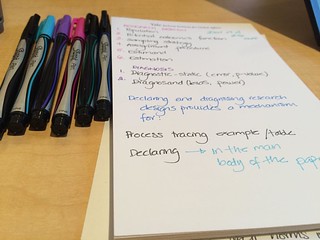 I have written before about how I believe that writing is a craft and an art. Writing solid prose requires technique, inspiration and knowledge of the subject matter. Learning how to write is a process that helps authors who are interested in producing cohesive, cogent and easy to read text. But I believe that the best way in which someone can learn how to write is by developing a writing practice.
I have written before about how I believe that writing is a craft and an art. Writing solid prose requires technique, inspiration and knowledge of the subject matter. Learning how to write is a process that helps authors who are interested in producing cohesive, cogent and easy to read text. But I believe that the best way in which someone can learn how to write is by developing a writing practice.
John Warner’s “The Writer’s Practice: Building Confidence in your Nonfiction Writing” is one of the best books i have ever read to help me learn how to write nonfiction. I very strongly believe it will have the same effect on other readers.
For me, it’s always a bit hard to write about a book that I keep coming back to, because in this case, it’s a workbook and I don’t think I can excerpt anything without giving away how excellent it is. So I went back to every tweet I have sent about this excellent book to assemble this blog post.
First of all, this is a workbook. You’re not supposed to passively read and voilà, your writing will automagically improve. You need to WORK.
In The Writer’s Practice, @biblioracle charts a series of (very serious and well crafted) exercises that will give you the experience of writing something different. With each experience you’ll learn a different writing skill. Warner asks you that you know yourself as a writer. pic.twitter.com/QsLzDXc4my
— Dr Raul Pacheco-Vega (@raulpacheco) June 6, 2019
After reading The Writer’s Practice, this is what came to my mind: “I need to read this book either as I teach a writing class or as a guide book to walk me through a semester of learning how to write”. You can’t do TWP in a weekend. Too many diverse experiences to try out.
Upon reflection, you *may* just zoom in on the research writing exercises/experiences if you are really pressed for time. Another way of approaching this book is to develop your skills throughout the week, but again, you need to devote the entire week if you want to finish it.
A very minor quibble: Warner spends a reasonable amount of time asking you to think about your audience, yet I didn’t see a strong emphasis on the social aspects of writing: ask people to read your drafts and give you feedback. Doing this (asking for feedback) improves MY writing.
Overall impression: great workbook to help you improve your writing. To be used in a writing class or throughout an extended period of time. In fact, Warner (at the end of the book) provides two models to teach using TWP. I am glad he does the same as Dr. Wendy Belcher with her own book. Strongly recommended.

0 Responses
Stay in touch with the conversation, subscribe to the RSS feed for comments on this post.